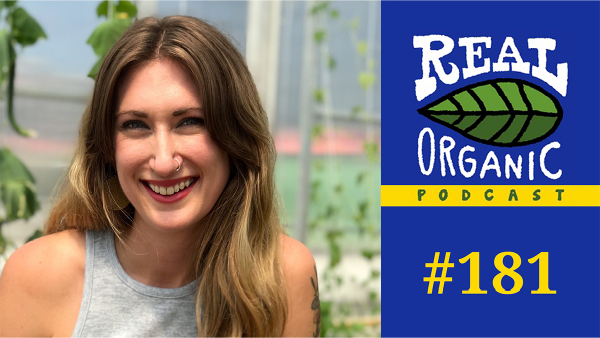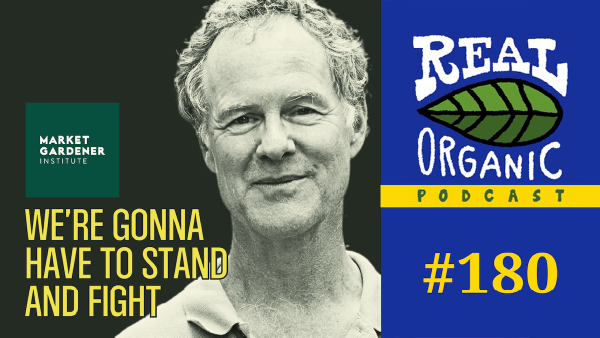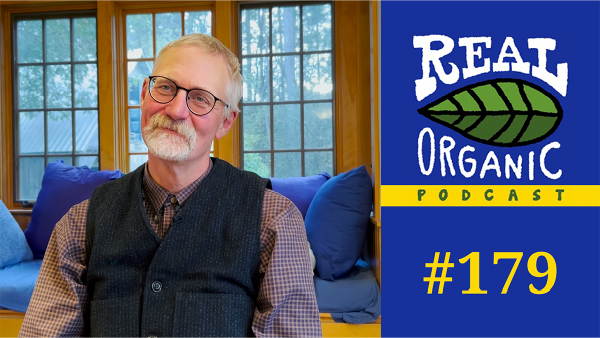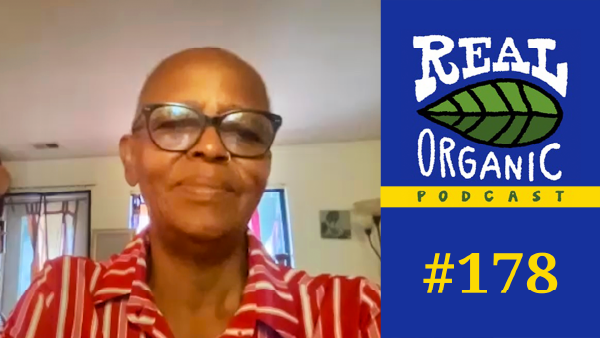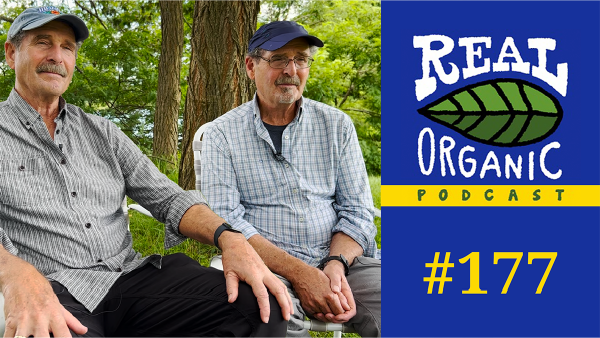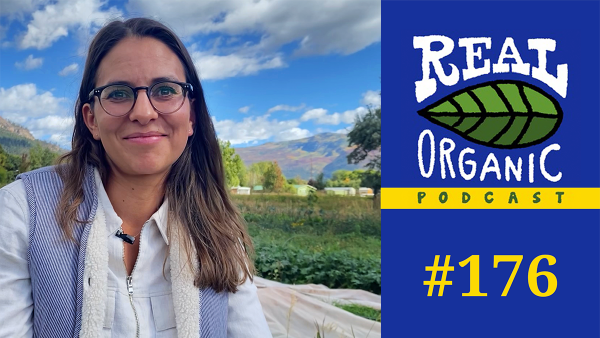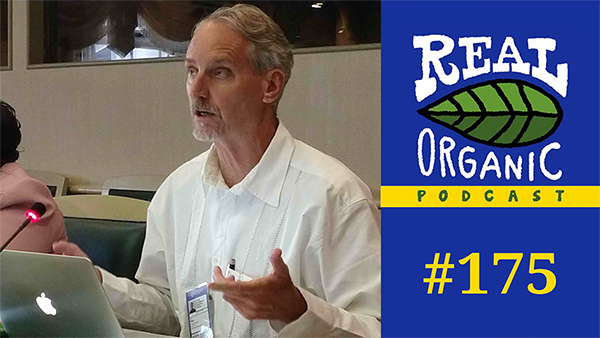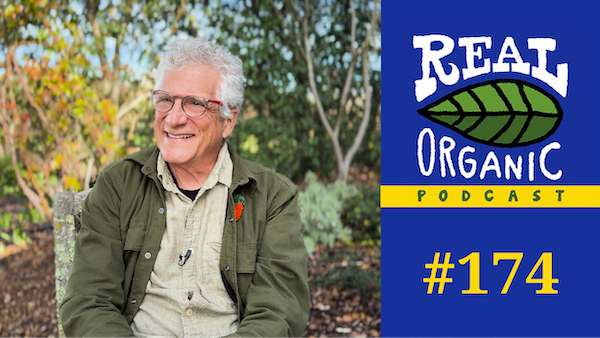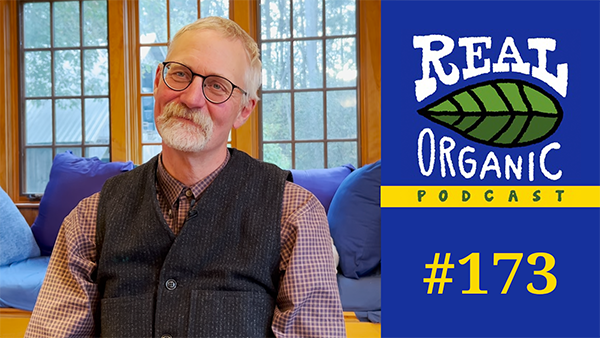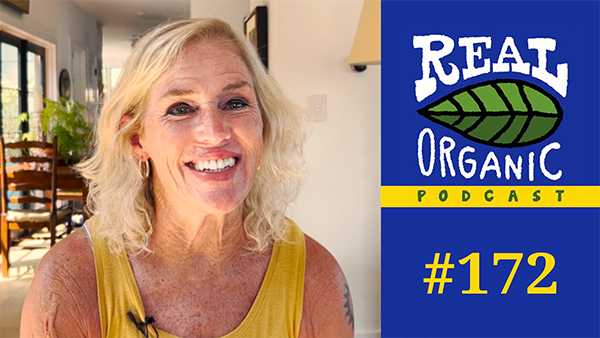Episode #158
Vandana Shiva: False Claims Of The Green Revolution Now and Then
Welcome! You can subscribe and download episodes of our show through your favorite podcast app.
You can also subscribe to receive the video version of each episode on our YouTube channel.
Our Vandana Shiva interview has been edited and condensed for clarity.
Dave Chapman interviews Vandana Shiva
Dave Chapman 0:00
Welcome to The Real organic Podcast. I’m very pleased today to be speaking with Vandana Shiva. She is one of our movement’s heroes. Vandana is the author and advocate of biodiversity, conservation and farmers rights. Perhaps, she’s the most influential international voice for local organic agriculture. She’s truly a champion of the soil. She’s a relentless opponent of centralized commodified industrial agriculture. She founded Navdanya, which promotes agro-ecology: she’s authored more than 20 books, she received the Right Livelihood Award, along with many others. Welcome Vandana.
Vandana Shiva 0:48
Hello, Dave.
Dave Chapman 0:50
I want to start with a little bit of history. I want to go back and have you talk about the Green Revolution. I think that this was such an important development in this long struggle. So could you talk about Green Revolution from your perspective?
Vandana Shiva 1:09
So you know, my background is physics and my PhD is in the foundations of quantum theory and hidden variables in nonlocality. And agriculture was very far from my disciplinary training, of course, my mother when she became a refugee, when Pakistan in India was split, she used to have a government job on the other side. And when she came to India, as a refugee she said ‘I have done all the work, I’ve broken all the glass ceilings, now I don’t want to do government work. I just want to be a farmer’.
Vandana Shiva 1:42
And so of course, as children, we’d grown up on her farm and this was a pre-Green Revolution farm. 1984 is the year the Green Revolution kind of came into my life. I done my MSC honours in particle physics at the University of Punjab in Chandigarh. And, you know, for four years, I was at that university. And it was a peaceful place, a prosperous place, the richest part of India.
Vandana Shiva 2:15
And, and then in ’84, it had exploded into violence: 15,000 people had been killed. And the narrative that was being given is it’s a religious violence, it wasn’t it wasn’t at all. Because, for example, the people being killed were the ones who controls the Bhakra dam, which control the rivers. The head of the Seed Corporation, which controlled the seed supply, which was the Green Revolution seed supply. So I decided to look at what was causing the conflict.
Vandana Shiva 2:55
I was in those days working for the program for the United Nations University on conflicts over natural resources. And we built huge movements around forest questions, around fisheries questions, around river questions. And then this violence emerged. So I went to the roots. So often, I had to cancel my trips, because the trainer was traveling in, you know, couldn’t reach because the track had been bombed. The bus I was taking had to come back because the bus ahead of us had been bombed. So that was the atmosphere in which I did that study. And the violence of the Green Revolution in America is available from the Kentucky University Press.
Vandana Shiva 3:42
I in a way, looked at the Green Revolution from the lens of quantum analysis. You know, in quantum theory, there’s nothing like a single core single effect. This context creates a particular context creatively. And I said, there’s a context that’s creating the violence, what is the context? And that’s how I had to go back to the Green Revolution.
Vandana Shiva 4:04
Now 1966 is the year the Green Revolution was introduced to India. It’s not that they hadn’t been trying to introduce the chemicals – ever since the end of the wars, Rockefeller and Ford had been pushing the chemicals. The problem was native seeds don’t like chemical – I call it the civil disobedience of native seeds. Because native seeds are bred for multipurpose struggles to the soil, it grows to the animals, the green that goes to humans. So you maximize everything, you maximize the straw and you maximize the green. And when you take the total biomass into account, all traditional varieties produce more. And then if you take the nutrition into account, they produce much, much, much more.
Vandana Shiva 4:50
So I realized that the chemical issue had been pushed for a long time but the seeds and the chemicals didn’t go together. So Norman Borlaug was put on the job of changing the seed and the plant for the chemicals, for the fertilizer, because the lodging problem was a big break for them in the console. And Borlaug’s basically took tall plants and replaced them with dwarfs. So they’ve got dwarf varieties. And you know, I always think of that silly little film “Honey, I Shrunk the Kids’ or something like that, yeah? So Norman Borlaug was basically saying, well I shrunk the plants, and on top that said I’m producing more. Now how can you shrink a plant and claim to produce more?
Vandana Shiva 5:37
So I went into deep depth both into historical records at that time. And since then, we’ve done a lot of research on all this. On our farm at Navdanya we measure every season, we measure all the native varieties: we saved 750 varieties on our farm of rice, 250 varieties of wheat, every pulse, every oilseed that you can imagine. So Borlaug, who had worked for the DuPont defense lab was put to this job of changing plants, changing agriculture. And in ’65 we’d had a drought. The drought meant that there was an increase in price – there was no starvation, there was no famine. ’42 was the last big famine, during British rule.
Vandana Shiva 6:20
But the story that’s always told is: oh, a Green Revolution got India out of the ship-to- mouth existence. We got in there out of farmers – they show ’42 famine images, and make it look like the Green Revolution solved that. No, we solved it through independence, we became free as a nation! So, the ’65 drought was used to push the Green Revolution. And our Prime Minister of that time wanted to import a little more wheat just to stabilize prices, not because anyone was starving. The farmers had gone back to their villages and they weren’t working at these big, you know, townships of steel plants and all of this giant, new, modern India, so people wouldn’t work. And so they had to lower the costs of wheat. And Shastri wanted to import a little more wheat. And Johnson, who was the President at that time, said sorry, you got to change your agriculture. You’ve got to adopt the chemicals, you’ve got to adopt the new seeds. And very mysteriously Shastri died while visiting Tashkent for the peace talks with Pakistan. Then the push carried on and they pushed the Green Revolution.
Vandana Shiva 7:34
So it’s not that India chose it; India was forced to adopt it. It was totally a Rockefeller-Ford-Chemical Industry push, with Norman Borlaug playing the role of basically creating dwarf plants he’d stolen; you know, stolen wheat from Japan during the war and stolen rice from – well he didn’t do the rice, that was done by Erie. And in my book I went into depth about what happened to the water, because it [chemical seeds] uses 10 times more water so there’s a water famine.
Vandana Shiva 8:06
What happened to the soil? Chemical fertilizers killed the soil, as we know. That’s why Real Organic is so important. Biodiversity – Punjab used to grow 250 species of plants. Now it is growing rice in one season, which is not a crop of Punjab, and wheat in another season. And rice, of course, needs a lot of water, but it needs 10 times more because of the way chemicals create thirsty soils. Toxics: there’s a train that leaves Punjab that’s called the cancer train. We have a book called “Toxics in our Food”, which has synthesized all the research – the key districts of Punjab where the cancer rates are very high are the key Green Revolution districts.
Vandana Shiva 8:55
So you touch anything and the beginnings of the problem are the Green Revolution, including the farmers protests, and because it was collecting every document that the farmers were putting out. In fact on the 4th of June, when Indira Gandhi had to send the military to the Golden Temple – the reality was: that day the farmers had called a blockade. They said: we are living under slavery – if we can’t choose the seeds we grow, if we can’t choose how we grow it, if we can’t decide when the waters of our own rivers will come to our feilds, if we can’t decide where we will sell what we grow, and we can’t decide what price we will sell it at, we are living under slavery. So the 4th of June 1984 they called for a blockade and said we will not supply daily. That’s when the military was sent to the Golden Temple, and that year, well it was a shaky time – Gandhi was assassinated, and that’s what pushed me. And that same year, Indira Gandhi was assassinated just three days before Bhopal. So the Bhopal disaster was a second wake up call for me – why are we using chemicals that killed thousands of people? How did this pesticide plant owned by Union Carbide (now owned by Dow-DuPont, which is now Corteva) – why? I’d grown up controlling pests with the neem and grown up controlling pests with the hundreds of trees that we have.
Vandana Shiva 10:23
We have a book called “Biodiversity: Agro-ecology and Organic Farming”, which documents all of this work of regenerative organic farming, because we just decided if they were going to attack organic, we’re going to continue using organic and just prefix it with regenerative because it’s based on regenerative processes: regenerating the soil, regenerating the biodiversity, regenerating the water. So that’s the story of the Green Revolution – India was the first lap. And today’s farmer protests’ actually continue from that time.
Dave Chapman 10:58
It seems that the Green Revolution, the real Green Revolution was the revolution of Green Money. It was about who owns what, who controls what-
Vandana Shiva 11:11
Exactly
Dave Chapman 11:12
It was designed to make a very small number of people pretty wealthy – I mean, I think one of the outcomes of Geen Revolution, when it hits a place, is that the ownership of the land as they move to monoculture-
Vandana Shiva 11:26
In the first five years, 25% of the small peasants had disappeared in Punjab, because they couldn’t afford the chemicals. And then the lands continued to get consolidated. And basically, the small farmer who’s the real provider of food (as my book “Who Teally Feeds the World” has documented): you know, it’s the small farmers who feed the world. The large farms produce commodities, as you said, and commodities don’t feed people: they make biofuel, they make animal feed. And that’s the reason the Amazon has been invaded with GM soil. Not because people need it for eating. And I think the way you describe the issue of commodification – chemical inputs and commodification, they go hand in hand.
Dave Chapman 12:23
Yeah, yeah. It’s amazing. I think most people live in a world where everybody understands what the Green Revolution is. But I don’t think most people that I know in America know what that is. They’ve heard about it, they got the Nobel Prize, it saved a lot of people from starvation. That’s the story that’s told.
Vandana Shiva 12:46
Dave, even in India, the children are taught that the Green Revolution saved India. So when I go to schools, and I talk about our work in Navdanya – a kid will always put up their hand, and say but our book says Green Revolution saved us from starvation, and I have to go through the calculus. That yield per acre doesn’t tell you anything. Nutrition per acre is what you should measure. Real Cost, the wealth per acre is what you should measure. And organic is where farmers produce more nutrition and on better incomes, if true cost accounting is done. All the subsidies that go for the wrong thing don’t hide the true economics.
Dave Chapman 13:31
Yeah. There’s a battle going that’s been going on for a long time. Can we look at Farm to Fork initiative in the EU? I think that that is also a reaction to chemical agriculture, and it’s an attempt to reduce the use of chemicals by 50% in the EU and to increase the Certified Organic Land to 25%. That’s a very bold thing for a government to choose to do. And they’re trying to export that to the rest of the world. And what I see is that there’s a battle for hearts and souls, and the the other side, unfortunately, is led by the United States, by the USDA. And they have tremendous power, and they come in – they hate the Farm to Fork initiative. They want people to use chemicals. Right?
Vandana Shiva 14:30
Yeah.
Dave Chapman 14:30
So do you see that battle played out in India at all? Or is that-?
Vandana Shiva 14:37
Yes, very much. It’s, I mean, we don’t use Farm to Fork because we don’t use forks. But definitely the creation – first of all, online is full of local markets. When I go to remote villages in Bengal, in Orissa, you know, you go to a village and if it’s a weekly market day, women will be there sitting with 10 bin brinjals (eggplants), someone will be sitting with lady fingers (bananas), another woman will be sitting with greens: local produce! So local, which also maximizes biodiversity, because local people eat what has grown locally. And we have enough Donea, reinforced that idea of local economies, local living economies.
Vandana Shiva 15:30
We encourage farmers to first eat organic, you know, when we certify our farm farmers, they keep diaries. And I always say you first put down what your family needs. And the first share of organic will go to your children and your family. The second should be sold in the community and the village. And only a few rare items should go to distant markets. And for that, we will support you totally, but the rest you should create. It’s quite amazing, you know. Women up in the mountains have created barter systems: one grows onions, one grows tomatoes and they exchange. They’ve created local, you know, they bring their vegetables into the local market and sell once a week. So people are creating these new initiatives.
Vandana Shiva 16:22
It is the same as Farm to Fork and of course, all our farmers use only Native Seeds, and do only Organic farming. And the third pillar of all this is local economy. Farm to Fork actually took a lot of work, because a big movement in Europe, to save the bees and humans, and farmers – save the bees and farmers – was launched. They did ask me to be a patron of this, when it was launched – it was before COVID. And millions of people signed, and that kept building up for getting rid of pesticides and out of that came Farm to Fork. So in Europe, there is not just a group of Organic farmers, there’s a very strong group of conscious consumers. And the two have joined hands in the Farm to Fork.
Vandana Shiva 17:21
For me, it’s tragic that the United States, which started as a farming country; both, if you think of the history of the Native Americans, they were farmers – or you think of the settlers. America was a land of small farmers. And that’s what made it a free land. And then the war, as I’ve written in many of my books: “The Violence of the Green Revolution”, “Oneness versus 1%”, “Who Really Feeds the World”.
Vandana Shiva 17:53
I have tracked that all these fossil chemicals, because all chemicals for agriculture are made from fossil fuels, whether it’s fertilizer or pesticides or herbicides, originate in Hitler’s Germany. Now IG Farben had the skills of chemistry. And the skills began by trying to displace India’s natural Indygo and to make artificial dyes and that’s where the chemistry really started. But during Hitler’s time, Standard Oil, which was Rockefeller, joined hands with IG Farben they had a company and I have it in my book (this was “One vs 1%”), that IG Farben, Standard Oil, Rockefeller provided the money and the fossil fuels. And IG Farben provided the chemistry. They made explosives using fossil fuels. And then those explosives became fertilizer factories, and they talked about growing food in the air. Because they were fixing atmospheric nitrogen.
Vandana Shiva 19:02
The first chemicals to kill people in concentration camps were the origins of pesticides. That can be, and that’s how all of these trends start. The tragedy is that most people don’t know US corporations were deeply involved. Monsanto had a company with buyer called Mobi. And now, buyers bought Monsanto. So in a way they’re back in the original. DuPont used to work with IG Farben. So all of the American companies who today are what I call the Poison Cartel, have the common roots at the time of Hitler’s Germany and the War. In a way I see the Green Revolution/Industrial Farming as a war against the Earth.
Vandana Shiva 19:59
When I wrote the book “The Violence of the Green Revolution”, I didn’t know what would be the right way, I just called it Nonviolent Farming, I am security. Why are we using these tools of war? Why are we using these tools in the most beautiful activity which is caring for the earth? I know you’ve been so deeply involved in the fake organic, yeah? Because for me, farming and agriculture means to care for the land. Organic Farming means to care for the soil and regeneration of the soil. The minute you banish soil, you’ve already lost Agriculture and Organic. And that’s why I found torn pieces of Howard’s book “The Agricultural Testament” -and from there, we could rebuild what India used to be like.
Vandana Shiva 20:58
As you know, Howard’s Agricultural Testament is called the Bible of Modern Organic Farming. And, I think it’s so important for all your listeners to know that first, they tried to substitute the soils (regenerative fertility, which comes only through organic) with synthetic fertilizers. Pretending that they can grow food in the air. Then of course, they went for the seed. Your seed renews itself, your seed multiplies. They said “no, seeds shouldn’t renew, seeds should be intellectual property. And so they started to do genetic engineering, in order to make seeds non-renewable and to continue to sell pesticides.” Round-Up ready crops sell more Round-Up. BT-toxin crops also sell more pesticides because they don’t work. Now they’re working on two elements that are being pushed by the US Department of Agriculture, and sadly, the Envoy for Climate Change, because right now, every wrong kind of agriculture and food activity is being offered as a solution to Climate Change.
Vandana Shiva 22:12
And the project is called: the Innovation Mission. Yeah? Because there’s this obsession that everything that is, nature that is, is obsolete, but man who made the Impossible Burger, he says animals and plants are unimprovable technologies – they’re constantly evolving technologies! Unimprovable technology, and he says I have a technology that will constantly improve – it’s failing. 14 patterns and failing. I’m doing my next book on climate change and the Fake Food Push. And while I’m writing the chapter, one by one, the companies are failing.
Vandana Shiva 22:52
So on the one hand in agriculture, the whole issue of Digital Agriculture Drones, and I call it – the first was the soil is empty and then the seed is empty, and now the head is empty, the farmer’s head is empty. He has to be fed with instructions on his smart phone how to farm. And how do they get the farm instruction? By first going to the farmer’s field, it’s called Field View: the Monsanto Buyer Program. Field View: they go to the farmer’s field, photograph his whole farm, then feed it back into his smartphone, make him pay for the data and tell him now turn left and irrigate, put this much fertilizer. But it’s a system that can only work with external inputs. Internal inputs, organic farming, is a self-organized automatic system. It cannot be managed externally. All you have to do is support the system to work well.
Vandana Shiva 23:51
And then of course, the Fake Food issue. We’ve already got 75% sickness because of ultra-processed foods, which means fake ingredients. But now they want to push it all the way and pretend that somehow this will solve the Climate? No! My book “Soil Not Oil” tracked, at that time, that about 45 to 50% emissions come from Industrial Agriculture. And Organic Farming is a solution. Now since I wrote that book in 2009, so much data on Organic Farming and how through the power of plants, the photosynthesis, and the soil temperature: that is how you solve the Climate Problem, and you solve the Food Problem, and the Nutrition Problem.
Vandana Shiva 24:35
So when they talk about Fake Food, what they don’t tell you is it will need five times more feed stock than the cows who they want to finish off. It requires 25 times more energy and has 25 times more emissions, because it’s energy intenseive! And that’s why all this hydroponics, all of this vertical farming – what I learned when I just studied the Green Revolution was the two bits that they always leave out, which are key to any system.
Vandana Shiva 25:15
The first is energy use: do you put in more energy then you get out? Then it’s a negative energy system. Second, do you put in more resources than you produce? Industrial Agriculture uses 10 units to produce one unit of food. By the time you get to Industrial Factory Farming, it goes up to 100. By the time you get to Industrial Lab Food production, it’ll probably be 1000 or 2000. So the energy calculus is always left out, and that’s where the real answer is. Because when you work with the living soil, and you work on small scale, and you work with the biodiversities on energy – that’s how you actually generate negative energy.
Vandana Shiva 26:06
Schrodinger, because I did quantum theory, Schrodinger has a book, “What is Life”, and he says, life is not like a machine, so we can’t apply thermodynamics to it. Life cheats thermodynamics all the time. It’s a negative entropy system. Machines create, labs will create entropy and waste. Plants don’t create waste, they bind the energy to create negative energy. And that’s how the Earth has been sustained. That’s how Organic Farming has renewed the Earth’s processes. And that’s what we must continue, no matter what nonsense is pushed.
Dave Chapman 26:46
Okay, so we face a challenge. And the challenge is that the corporations have become very skilled at putting on sheep’s clothing and joining the flock. That’s how the Real Organic Project got born, because we realized that we had to fight for the meaning of Organic, and I see the same thing is happening with Regenerative now. Regenerative agriculture – the most vocal champions now are Monsanto, Syngenta, Cargill, Pepsi and McDonald’s – it’s the same playbook, but they like it even better, because there’s no legal definition.
Vandana Shiva 27:35
You’re very, very right Dave. You know, I’ve just done a foreword to a book on Real Regenerative their bringing out in Germany, because Syngenta is really pushing it. But if you go down the line, the first bit is regeneration, and the next bit is all chemicals. So tucked away in the definition of Regenerative is the old Chemical Farming. And I think if there’s one thing Orwell’s “1984” taught us, is don’t trust words, because in an age of Doublespeak, the words will mean the opposite of what they are. And that’s why we look at the practice.
Vandana Shiva 28:19
So, Organic actually means the science of Life: science of living systems, that’s the original definition. But because industrialism could not tolerate the idea that living systems had any science: you know, the best of scientists were attacked, the best! Gertie was attacked. I don’t think Howard was so badly attacked, because he stayed on in India for a long time, but in England, the group that formed the Soil Association, of course, they were badly attacked. And I think what we should always look for is, yes, there’s appropriation of the word, but always look for the practice: is the practice still chemical? And that’s why the practices of Organic is what we have to promote.
Vandana Shiva 29:10
And second, you see in the first round of Organic, we worked in a privileged space. There were consumers who were willing to buy, and there were Organic farmers who would produce. Now the Organic farmers have been bought out by the big giants, and Organic trade has been bought out: Whole Foods is now Amazon. We’ve just done a manifesto of the movement I started called Diverse Women for Diversity, and we call it: Making Peace with the Earth. And, you know, women, 50 women from around the world drafted different sections. You should look at the Navdanya International website and find it. But you know, there’s this group of Latin Americans who said, market free solutions, not free market.
Vandana Shiva 29:57
So what we have to move towards is the fact that there are three crises at the same time. Farmers are facing a huge crisis of survival, both Organic, and the ones who are conventional. They’re not – no farmers are surviving. So we need an economy where they get the fair share. And that’s the only way they get is is from direct relationships with those who eat. Second, is those who eat are suffering from huge epidemics of disease. And as is often said, in the Organic movement: pay for Organic today and save your bills from the doctor tomorrow – yeah? Because I have started saying Organic is actually a provisioning of health.
Vandana Shiva 30:45
It’s not a product. It’s providing health, it’s providing health to the soil, to the planet, and it’s providing health to people. So we should start looking at it as a health system, and therefore get the farmers to join the eaters. The CSAs were like that – yeah? And we’ve got to bring -farmers markets were like that – we have to bring all that back. And the third element, of course, is the fact more and more people are falling into poverty. You know, the hunger right now in the UK, in America, the cost of living crisis? I think we’d have to crack that. Because there is no way we can just let our brothers and sisters die of hunger, including in the rich countries.
Dave Chapman 31:31
You wrote a book many years ago called “Monocultures of the Mind”.
Vandana Shiva 31:38
Yeah.
Dave Chapman 31:39
I think that’s a very important term. Because what we’re talking about in the end is not changing a rule or regulation, or a law. It has to be changing how we think.
Vandana Shiva 31:51
Absolutely.
Dave Chapman 31:53
Can you talk about that a little bit, Vandana?
Vandana Shiva 31:55
Yeah. So you know, my early activism, of course, long before Green Revolution and Punjab, was working with the Chipko movement for forest protection. And you know, the women said, we’re going to hug the trees. You kill us before you kill the trees. And what they were defending were the mixed forests. Now, you know, what they call wildfires these days, are actually manufactured fires for a simple reason. You spray Round-Up on a mixed forest, and you kill every broadleaf species to harvest the conifers. You will have desiccation. Round-Up is a desiccant. You make a forest dried up and desertified – of course it will catch fire! So it’s the Round-Up driving those fires.
Vandana Shiva 32:47
In those days the women used to constantly talk about how rich the natural forests were, how much they produced: they knew all the biodiversity. I always say, my University of Biodiversity was the women who’d never been to school. And then came the Green Revolution. Here are people saying, oh we grow more. It’s a monoculture. It’s a sad, pathetic monoculture of dwarf plants of one species. When we grow nine plants together, that’s what Navdanya means. Twelve plants together, mixtures everywhere!
Vandana Shiva 33:17
So I said: what is letting the people who said this is more productive, and this is unproductive – infact, there was an essay in which I cited a study in which they said: in a rain forest, most species are clearly weeds, because they’re not commercial. So the Monoculture of the Mind is the mind that looks at nature from the perspective of a market, of commodities. There are only a few species of the forest that you will extract and the rest are called weeds. We used to eat 10,000 species of plants. But when industrial agriculture and commodification of food came in, we’re eating 10.
Vandana Shiva 34:06
You know, the soups are made of the same soya, the bread is made of the same soya, the milk is made of the same soya. But of course, for our gut microbiome, this feels like an assault. Same for wheat, uniformity of wheat. So I realized what’s blocking people from seeing the reality that is diversity, producing more diversity, being rich in the forest, in the ocean, in the farm, is this blinker of the Monoculture of the Mind. You put on your blinkers, you won’t be able to see the diversity, and that’s how the term Monoculture of the Mind came: it’s the problem of the mind.
Dave Chapman 34:53
Okay! And that mindset has produced Corporate Agriculture?
Vandana Shiva 35:00
Yes, absolutely. See, the mindset has three M’s in it. The first is, of course, it comes from militarism, the products came from militarism. But the mindset is: oh, every insect’s an enemy, just wipe them out, every plant is a weed, just glyphosate them to death, round them up. Every fungus is an enemy, and so they create pathogenic fungus. And then they have to – you know, the whole neoniconide debate is because they coat the seed with neonicotinoids, only because you’ve killed the beneficial fungi in the soil.
Vandana Shiva 35:43
And all of this treadmill of chemicals, is a result of the military operation in the mind. But the second is: scientifically, it’s rooted in the mechanical mind, of thinking of the world as a machine that you run, and you fix and you operate. Not as a self-organized system, that guy is a self-organized living organism. Every seed and every plant is a self-organized system. Every microbe is a self-organized system. Now that’s the true science of life. And that’s what Organic is.
Vandana Shiva 36:17
And then third: is, of course, the blindness of monoculture. So Militarism, Mechanistic Thought, and the Monoculture of the Mind – we need to move from that to peace, making peace with the Earth. Definitely moving out of the Mechanistic Mind to the Ecology of the Mind. Because we have that capacity as human beings to think differently, to think in relationship with the living world. And finally, instead of Monocultures of the Mind, the biodiversity of the mind – yeah?. So living knowledges – yeah? And knowledge is of peace.
Vandana Shiva 37:00
It’s very exciting the work we do on the ground; you know, the women farmers and understand all this, like this. What they give back then, is such wisdom. Because, you know, they’re practicing with the Earth. And, in fact, my next book, which will come out by synergetic pressures on the living Earth. At the end they wanted a last chapter on all the positive things that are happening. And of course, all that is happening with real people on the ground. I think we have to shift the Organic Movement into a movement of the people – you know?
Dave Chapman 37:36
Yeah.
Vandana Shiva 37:37
Earlier when the standards were secure, and the markets were honest, we could depend on all of that. But now everything’s been corrupted, but food is still needed. And we still need farmers. And definitely one of the slogans I criticize very strongly is from Bill Gates and his paid journalists, which is basically: farming without farmers, which is this whole digital agriculture. Farming without farmers, food without farms. That’s where they want to go. Green Revolution was the first step. But now they want to go farming without farmers, food without farms. And the only way we’ll be able to work into the future with a different worldview is farming by loving farmers who care for the Earth, and food from farms that produce good food. And that will be the revolution of our times.
Dave Chapman 38:35
Yes. I talked to a woman who is working as an organic advocate in Tanzania, and she said in her country, there’s not a single desk in the whole government to support Organic agriculture. But there are many desks to support Chemical agriculture. Now in India, there’s more of an actual battle because there are over a million Organic farmers in India I have read – is that true?
Vandana Shiva 39:08
Yes, that’s true.
Dave Chapman 39:10
So you’ve got a big movement going against that Corporate agriculture, that Commodified/Centralized agriculture.
Vandana Shiva 39:22
And the reason for the growth of organic is first: if farmers get onto that treadmill, they get into debt. In the extreme cases, they commit suicide like in the case of the Bt-cotton, or they lose their land. So organic is a defense -you know? A defense against a farming that traps the farmer in debt. The second thing that’s happening is because of the Green Revolution, there’s water scarcity everywhere. Now Organic, as you know, replenishes the soil moisture and allows farmers to farm with increasing climate problems, and actually to turn the soil into a water reservoir. So all of these externalities of Industrial agriculture are creating a new opportunity for farmers to wake up. And wherever there’s a little facilitation, like in the regions where we work. Just a little facilitation – the farmers run on their own. In many regions where we work, the local administration is coming to the farmers and saying: teach us, tell us how to shift to Organic so we can shift our local policies.
Dave Chapman 40:41
Yeah, that’s great. My last question Vandana, it’s a big question, is, what can we do? Some people get this: they hear your words, they understand that there’s a choice that we face, but they see this enormous power that is very hard to stand up to. So, what’s your advice for what a person can do? What should they do?
Vandana Shiva 41:12
Well, if you’re a farmer, keep farming – don’t give up. And if you were growing a commodity that got you into a price crash and debt for inputs, shift to Organic – there will be people in your neighborhood who need food, just find ways to link to them. If you want to be a farmer, find ways to get access to land, either to lease it, or…you know, I’ve had so many people saying oh, you know, my father left me land, what do I do? I said, get 100 young people who want to farm and have them work the farm as a collective. People are dying – in universities in Berlin, in universities you know, I was baiting Bayer. And Bayer are saying the reason we need these new technologies is no one wants to farm. So we were in a debate, and I turned to the audience. I said: if you could farm how many of you would farm? So many hands went up.
Vandana Shiva 41:12
So we have to create new possibilities for farming. It won’t be easy, but we have to find ways. For eaters, really, just recognize that eating that crap is very cruel to your body – yeah? Organic is a necessity, it’s not a luxury. We’ve been made to feel it’s a luxury. And when you feel overwhelmed by the power of the Poison Cartel, just turn to the Earth, and turn within you, and think of the power of the Earth. You put one seed and it rose you your crop. Think of your power, your power as a thinking conscious being – yeah? We have a beautiful word for this, the power within the power to act: it’s called Shakti. So, you know, every time you get overwhelmed by the Poison Cartel and their power, turn! Turn the other way. Turn to the Earth, turn to yourself, turn to your community. We have the real power. We have the real power to do what is right, and in the process we make them irrelevant.
Vandana Shiva 43:00
Yeah. Thank you, Vandana Shiva. Thank you very much.
Vandana Shiva 43:40
Thank you, Dave. I’m glad all this worked out. I finally finally we made many attempts. This one worked out


